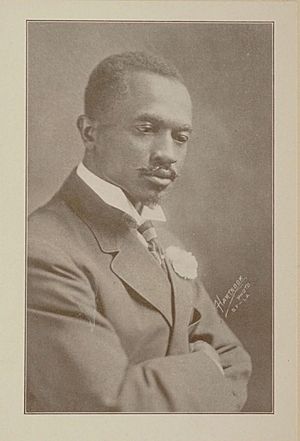Edward Smyth Jones facts for kids
Edward Smyth Jones (born March 1881 – died 28 September 1968) was an African-American poet. He wrote beautiful poems that are still studied today.
Contents
A Poet's Life
Edward Smyth Jones was born in 1881 in Natchez, Mississippi. His parents, Hawk and Rebecca, had been enslaved before he was born.
Early Education and First Book
Edward went to Alcorn Agricultural and Mechanical College for a short time in 1902. This school is now called Alcorn State University. Later, he moved to Louisville, Kentucky. There, in 1908, he published his first book of poems. It was called The Rose that Bloometh in My Heart. He used the pen-name "Invincible Ned" for this book.
A Dream to Study at Harvard
Edward always wanted to learn more. He especially dreamed of studying at Harvard University. In the summer of 1910, he left Louisville and traveled to Cambridge, Massachusetts. He walked most of the way, sometimes riding on freight trains.
When he arrived, he was tired, hungry, and had no money. He planned to sleep outside on the Harvard campus. But there was a misunderstanding. People didn't believe his story, and he was taken to jail.
"Harvard Square" Poem
While in jail, Edward wrote a poem called "Harvard Square." In this poem, he described his journey and what it felt like to be in jail. He wrote about hearing "the bitter wail" and asking God for help. He also wrote about finding inspiration for his poetry even in that difficult place.
"As soon as locked within the jail,
Deep in a ghastly cell,
Methought I heard the bitter wail
Of all the fiends of hell!"
O God, to Thee I humbly pray
No treacherous prison snare
Shall close my soul within for aye
From dear old Harvard Square.
Just then I saw an holy Sprite
Shed all her radiant beams,
And round her shone the source of light
Of all the poets' dreams!
I plied my pen in sober use,
And spent each moment spare
In sweet communion with the Muse
I met in Harvard Square!"
Getting Out of Jail and Later Life
Edward showed the judge papers that proved he was a good person. He also shared his poem "Ode to Ethiopia." With help from a Black lawyer named Clement G. Morgan and an educator named William Henry Holtzclaw, he was eventually released.
After leaving jail, Edward found work as a janitor at Harvard. He also started going to Boston Latin School. However, he couldn't finish his studies or enroll in Harvard College because he didn't have enough money.
By 1913, Edward was in New York. He worked as a waiter at the Columbia University Faculty Club. The New York Times even wrote an article about him. Not much is known about his later years. By the 1920s, he was working as a general laborer in Chicago. He passed away there in 1968.
Edward Jones's Poetry
People who read Edward Jones's poems during his time really liked them. They praised his clear writing and the strong pictures he created with words. They also admired his rich use of language.
Important Collections
One of his poems, "A Song of Thanks," was included in a very important book. This book was called The Book of American Negro Poetry (1922). It was put together by James Weldon Johnson. His work also appeared in other collections. These included Negro Poets and Their Poems by Robert T. Kerlin. It was also in a collection of African American poetry from the Works Progress Administration.
Unique Style
Edward Jones was known for writing in Standard English. This means he used formal, widely accepted English. Many other African American poets at the time used everyday language or dialects in their writing. Jones's choice of Standard English made his work stand out.
Today, some people compare his poetry to that of British Romantic poets. These include famous writers like William Wordsworth. Scholars also look at how his poem "Harvard Square" connects to the Italian poet Dante. They see it as a way to understand the experiences of African Americans in the early 1900s.
Works
- The Rose that Bloometh in My Heart (1908, under the pen-name Invincible Ned)
In Other Media
- A Canadian filmmaker and artist, Neely Goniodsky, created a spoken word animated short in 2018. It featured Jones's poem "Behind the Bars."


